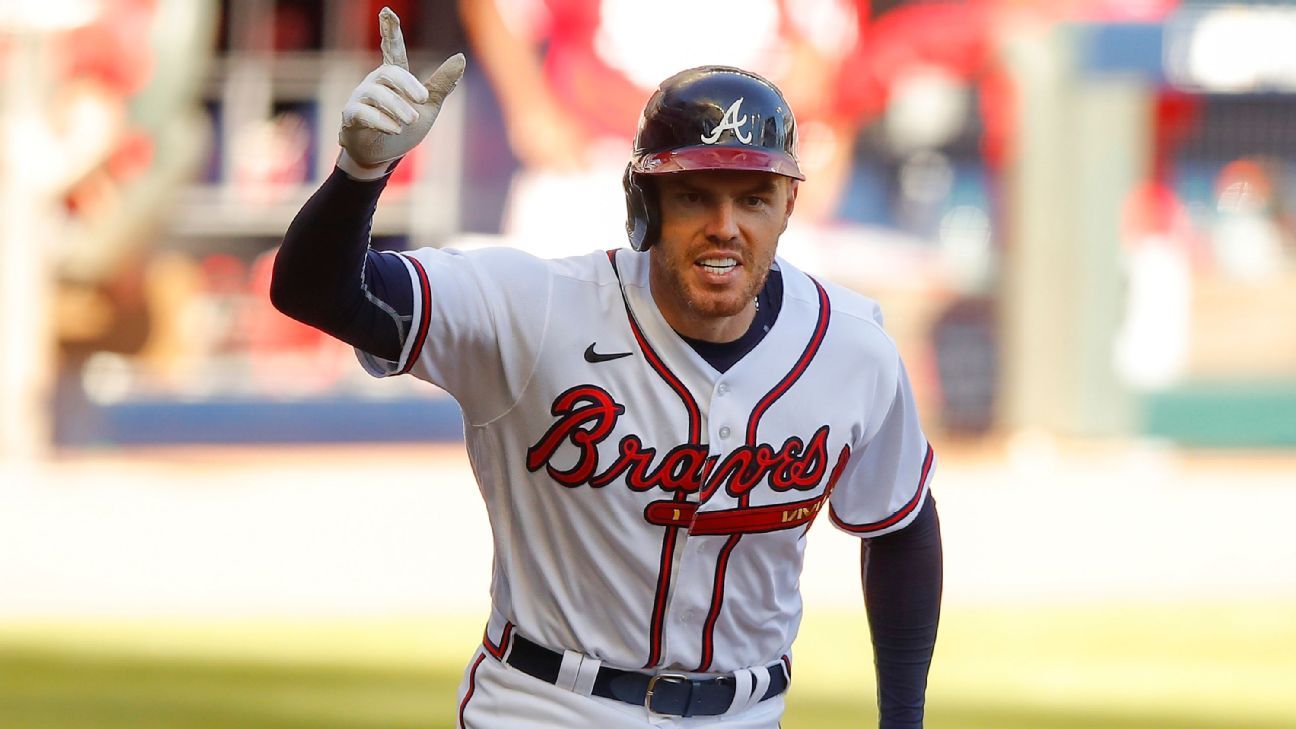As Opening Day finally approached, Freddie Freeman had far bigger concerns than perfecting his swing and practicing his scoops.
Just being able to walk a few steps was hard enough.
“It wasn’t the way I wanted to start, with COVID,” the Atlanta Braves first baseman said. “I was able to beat it.”
And then some.
Freeman easily won the National League MVP award Thursday, topping off a trying year that saw him become so ill with COVID-19 that he prayed, “Please don’t take me.”
Freeman got 28 of the 30 first-place votes in balloting by members of the Baseball Writers’ Association of America. Los Angeles Dodgers outfielder Mookie Betts got the other two firsts to finish second, and San Diego Padres third baseman Manny Machado was third.
In a season affected from spring training to the World Series by the pandemic, perhaps it was fitting the final major award of the year went to someone infected by the coronavirus.
Three weeks before the delayed Opening Day in late July, Freeman’s body temperature spiked at 104.5 degrees and he lost his sense of taste and smell. At one point, he recalled earlier, he said a little prayer because “I wasn’t ready.”
“It impacted me pretty hard,” he said.
Freeman said it took him a couple of weeks into the season to find his footing. He tried to conserve his energy, too — he skipped the daily routine of batting practice on the field and cut down how much he hopped off first base while holding on runners.
The 31-year-old Freeman soon found his stride, batting .341 with 13 home runs and 53 RBIs while playing all 60 games. A powerful lefty batter with the ability to spray the ball all over the field, he led the majors with 23 doubles and 51 runs.
Boosted by the four-time All-Star, the Braves won the NL East for the third consecutive season and came within one win of reaching the World Series for the first time since 1999.
Freeman is the sixth different player in Braves franchise history to be the NL MVP. Chipper Jones most recently took the honor in 1999 — Freeman wears a tattered Braves T-shirt under his uniform that was passed down to him from Jones.
Two-time NL MVP Dale Murphy of the Braves announced Freeman’s win on MLB Network.
Chicago White Sox slugger Jose Abreu earned the American League MVP, a recognition for leading his team back into the playoffs for the first time since 2008.
This was the first time since Ryan Howard and Justin Morneau in 2006 that a pair of first basemen won the MVPs.
Betts was bidding to join Frank Robinson as the only players to win the MVP award in both leagues. The 28-year-old outfielder took the AL honor in 2018 while leading Boston to the World Series title.
Traded by the Red Sox to Los Angeles early this year, Betts hit .292 with 16 homers and 39 RBIs and was the catalyst in the Dodgers’ run to their first championship since 1988.
Machado hit .304 with 16 homers and 47 RBIs as San Diego made its first playoff appearance since 2006. Padres shortstop Fernando Tatis Jr. finished fourth in the voting and Washington outfielder Juan Soto was fifth.
Freeman earned $185,185 and Abreu received $37,037 in contract bonuses prorated because of the shortened season.
This will be the first time in more than 75 years the MVP trophies don’t carry the name and likeness of Kenesaw Mountain Landis, baseball’s first commissioner.
In an Associated Press story in late June, former MVPs Barry Larkin, Terry Pendleton and Mike Schmidt said they favored pulling Landis’ name off future plaques because of concerns over his handling of Black players.
BBWAA members overwhelmingly voted in October to remove any mention of Landis from the MVP trophy, and the award won’t be named for anyone this year. The organization will discuss in 2021 whether to name it for someone else, with former Negro Leagues star Josh Gibson and Robinson among those being mentioned as possibilities.
“It’s just time. It really is time for the name to be removed,” Freeman said.
Pendleton works for the Braves, and Freeman paid attention when his friend spoke out over the summer. Freeman said he thought Robinson’s name on the plaque would be proper.
Landis became commissioner in 1920 and no Black athletes played in the majors through his reign that ended when he died in 1944. Jackie Robinson broke baseball’s color barrier in 1947.
Landis’ legacy is “always a complicated story” that includes “documented racism,” official MLB historian John Thorn has said.
In 1931, Landis gave the BBWAA control of picking and presenting the MVPs. During the 1944 World Series, the group decided to add Landis’ name to the plaque. His name had appeared on all MVP plaques since then and was featured more prominently than the actual winners of the Kenesaw Mountain Landis Memorial Baseball Award.
The Associated Press contributed to this report.
